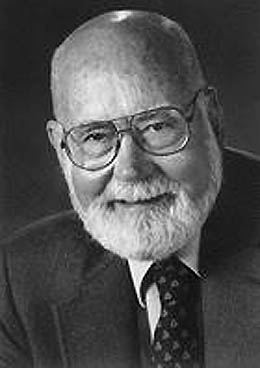On October 8, 1990, E. Donnall Thomas, M.D. (1920-2012) is named co-winner of the Nobel Prize in Medicine. The award honors the Bellevue resident for some 40 years of research on bone marrow transplantation, much of which was conducted at the Seattle-based Fred Hutchinson Cancer Research Institute. Dr. Thomas shares the 1990 Nobel Prize with Joseph E. Murray, M.D., of Boston, who developed related therapies to retard tissue rejection in organ transplants.
Dr. Thomas developed bone marrow transplantation to help treat leukemia, lymphomas, and other blood-related diseases. (Bone marrow produces red and white blood cells.) The therapy entails the destruction of the patient's diseased marrow with drugs or radiation. Healthy marrow is then rebuilt through the transfusion of donor marrow cells or, more recently, marrow-growing "stem cells."
Dr. Thomas conducted most of his research and clinical trials at the Fred Hutchinson Cancer Research Center. The Center was established in 1975 by William Hutchinson, M.D., and named to honor his brother, famed baseball player and manager Fred Hutchinson, who died of cancer in 1964. Originally based on Seattle's First Hill, the Center now occupies a growing campus south of Lake Union and continues to lead international efforts in cancer research, treatment, and prevention. In 1990, about 430 bone-marrow transplants were performed at the Hutchinson Center, to where patients come from around the world for treatment.
An obituary in the magazine Science had the following to say about E. Donnall Thomas:
"Don had what seemed to him a simple idea: Because normal bone marrow was easily destroyed by irradiation, shouldn't it be possible to destroy an abnormal marrow and replace it with marrow from a normal donor? Although simple in concept, Don's struggle to make marrow transplantation a clinical reality was long and difficult. Early attempts were unsuccessful, either because the transplanted marrow was rejected, or because the marrow rejected its new host. These failures led many to criticize Don's efforts as dangerous and futile. But his persistence paid off in the development of a therapy that has saved hundreds of thousands of lives" (Science).
The Nobel Prize was established in the will of Alfred Nobel (1833-1896) for annual awards to men and women who confer the greatest benefit on humankind in the fields of physics, chemistry, physiology or medicine, literature, and peace. The awards ceremony occurs each year in Stockholm, Sweden, on December 10, the anniversary of his death.

